Windows to the Land, An Alaska Native Story
Volume 1: Alaska Native Land Claims Trailblazers
ISBN: 9780971604483
Windows to the Land, Vol. I now available as an eBook
Windows to the Land, Volume I is the voice of Alaska’s first people from the Aleutians, through Southeast, around the coast, across the vast Interior to Prince William Sound. Windows features the untold story of the Alaska Native land claims forerunners whose fire in the belly birthed Native land claims. In their own words, they share the events that became the divide between traditional and modern Alaska.
As windows of the land, Unangan/Aleut, Alutiiq, Sugpiaq, Tsimshian, Tlingit, Haida, Yup’ik, Cupiaq, Iñupiaq, Tanacross, Upper Tanana, Ahtna, Eyak, Dena'ina, Deg Hi'tan, and Holikachuk they are the personal face of their cultures, of the Great Land, and of Alaska’s evolving story from the Russian colonial period to present.
Windows includes index, maps on every chapter and photos on every page.
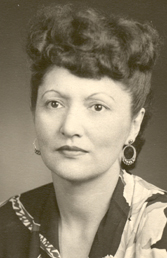
Elizabeth Peratrovich, Tlingit, author of Alaska’s Antidiscrimination Act in 1945.

Nettie Peratrovich, Haida, key developer of Alaska Native education.
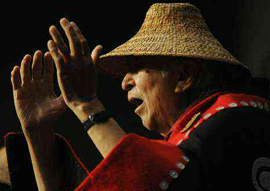
Francis Haldane, Tsimshian, dancer with Lepquinm Gumilgit Gagoadim.
Windows to the Land is an untold story of the reorganization of Tanana Chiefs Conference [TCC] and its offspring, the statewide Alaska Native land claims movement. Judy Ferguson has interviewed the trailbreakers, publishing them in their own voice, a story of the land and of its first people.
Al Ketzler Sr., First president of TCC, 1962-1964, 1969-1971, 1978. Acting Executive Director of AFN, 1971. CEO of TCC, 1991-2002.
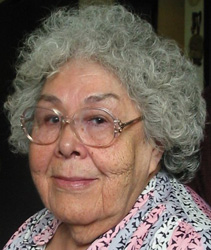
Alice Petrivelli, Aleut/Unangan, victim of World War II evacuation of Aleuts/Unangan.
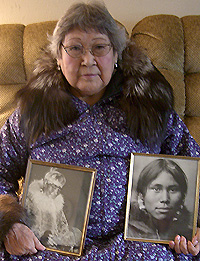
Margaret Toshavik, King Island Iñupiaq, daughter of Chief Olaranna.
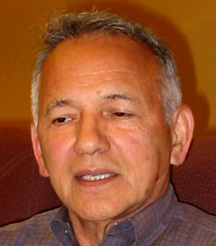
Emil Notti, Koyukon Athabascan, first president of Alaska Federation of Natives.
Windows to the Land is the story of the Great Land as told first-hand by those who first experienced its milestones, the first people of Alaska. Through the eyes of our indigenous cultures, the reader is immersed into Alaska’s evolving story. Judy Ferguson has recorded, statewide, unsung voices, of a land the size of many sovereign countries.
Emil Notti, First president of Alaska Federation of Natives

Don Wright, Gwich’in, president of Alaska Federation of Natives, who won Alaska Native Claims Settlement Act.
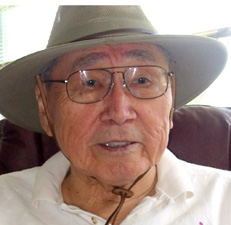
Dr Angayuqaq Oscar Kawagley, Yupik, cofounder of Alaska Native Knowledge Network, University of Alaska Fairbanks.
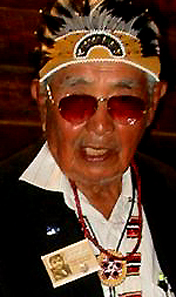
David Salmon, Gwichin Athabascan, TCC First Traditional Chief.
Windows to the Land is an important contribution to our understanding of Alaska Natives. A fascinating history of those who have shaped Alaska, written with the verve and accuracy we have come to expect from Judith Ferguson. A must read for anyone interested in Alaska history.
Judith Kleinfeld, Director of Northern Studies, Emeritus, University of Alaska Fairbanks. Author of The Frontier Romance: Environment, Culture, and Identity

Johnny Goodlataw, Ahtna Athabascan.

Clarence Alexander, Gwichin, former Grand Chief of Yukon; 2011 recipient of President Obama Presidential Citizens Medal.
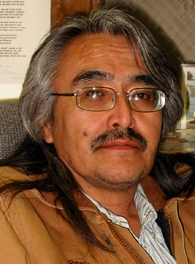
Jerry Isaac, Tanacross Athabascan, President Tanana Chiefs Conference.
Alaska Native women played a key role in not only Alaska Native land claims but in all of Native family life, education, and development. With great care, Judy Ferguson has successfully recorded these voices, from Southeast to the arctic, from the Russian colonial period to current.
Nettie Peratrovich, Haida, former Bureau of Indian Affairs superintendant, Nome District
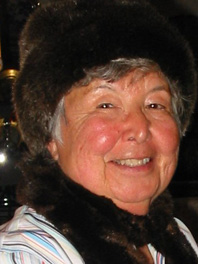
Virginia Lacy, Alutiiq.
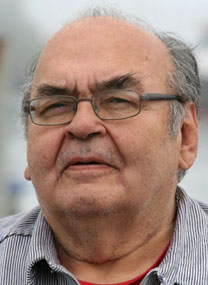
Bob Henrichs, President of the Native Village Of Eyak.
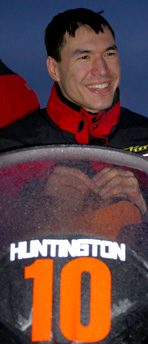
Tyler Huntington, Koyukon Athabascan, winner of the Yukon 800 and the Iron Dog.

Al Ketzler Sr., Dena’ina, Nenana; First president of Tanana Chiefs Conference (TCC).
Windows to the Land is a treasure trove of historical documents, interviews, and commentary capturing many of the key events and notable personages who have shaped the cultural and political landscape of Alaska over the course of the past century. Judy Ferguson has drawn on her extensive travels throughout Alaska to compile the observations and contributions of key players in the on-going saga of Native and non-Native struggles to create a shared environment for cultural co-habitation. From the gold rush and territorial days to statehood and land claims, Judy provides a region-by-region account of the historical events and personal stories that have defined the heart and soul of contemporary Alaska.
Both casual and seasoned readers of Windows to the Land will find much of interest in the personal accounts and the stories-behind-the-stories that define the sense of place and nurture the roots of Alaska. Through her personal commentary, Judy acquaints us with intriguing background and details about the people who lived through the key events that shaped the Alaska we know today. Of particular value for this book will be its use as a supplementary text to provide “windows to the land” in high school and college Alaska history classes. For the everyday Alaskan, the joy will come from learning about how ordinary people can do extraordinary things on behalf of all of us. This is a book for everyone’s library.
Dr. Ray Barnhardt, Director of the Center for Cross-Cultural Studies and Alaska Native Knowledge Network
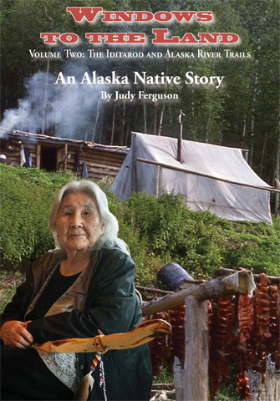
See also Windows to the Land, |
ISBN: 9780971604452
Is adventure through Alaska’s first people throughout all of Alaska.Covering competitive sled dog racing, canoeing and kayaking down Alaska’s major rivers, the Iron Dog, and the Yukon 800, featuring George Attla, Herbie Nayokpuk, Emmitt Peters, Ken Chase, Don Honea, Katie John, and Tyler Huntington.
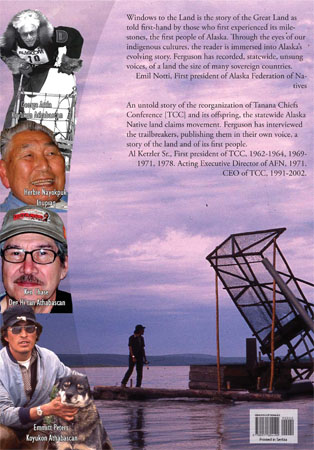
Fairbanks Daily News-Miner book review:
Varied viewpoints offer a cohesive look at Alaska Native life, history
Posted: Sunday, May 5, 2013 12:00 am | Updated: 9:40 am, Sun May 5, 2013.
David A. James / Book Reviews | 2 comments
FAIRBANKS - Delta Junction’s Judy Ferguson has spent decades seeking out and interviewing longtime Alaskans. Focusing on people’s personal experiences, she explores how our state’s history has been lived rather than rooting through the documents to see how it has been recorded.
While readers of her books need to look elsewhere for precise and detailed chronologies of key events, what they gain from Ferguson is a deep understanding of how those events affected individual lives. It’s an approach that offers history as it truly is: a messy and often morally ambiguous thing that impacts everyone living through it.
In her latest book, “Windows to the Land,” Ferguson turns her attention to 20th century Native Alaskan history, with a special emphasis on land rights struggles. It’s an impressive, informative, and expansive collection (and as the subtitle notes, it’s only volume one; a second volume is slated for publication later this year). It is also consistently fascinating to the last page.
The opening chapters include accounts by Natives from different regions of the state who share family and personal histories that shed light on the complex interactions they have had with Russians and Americans. In many of these interviews, Native elders tell of childhoods spent learning the ways of living on and from the land. They also provide glimpses at daily life in the newly established villages Natives were moved into early in the 20th century. Weaving throughout these accounts are recurring themes of cultural survival, finding ways to interact on Native terms with modern civilization, struggles with social problems and substance abuse, and the central role of faith.
A lengthy chapter focuses on Tanacross Natives of the Upper Tanana Valley region. It’s an illuminating history of their experiences and relationships with European immigrants — including early traders, missionaries, and government officials — and of the tug-of-war that gradually developed over control of traditionally Native lands. It was a period during which a nomadic people went from subsisting on millions of acres to being settled in villages. The names of many people and places familiar to Interior residents appear in this section, offering more recent arrivals a strong sense of what occurred here during the past century.
Unangax elder Alice Petrivelli tells of being evacuated from her childhood home in the Aleutians during World War Two and placed in a Southeast Alaska internment camp without food or potable water by a disorganized and largely indifferent government.
We also meet Tlingit elder Ada Haskin of Skagway, who grew up on the Canadian side of the border. At age 6 she was badly mauled by a dog team and spent five months in the hospital. At the time all Native patients were warehoused in a single room regardless of their medical condition. Upon her release Haskin was barred from attending the white school in Carcross. She was sent to the mission boarding school for Native children where the minister in charge was molesting girls. She reported this to her father who wrote an angry letter to the government. His efforts led not to the minister’s removal, but instead to her expulsion and the end of her formal education.
These are stories that need to heard.
Much of the book is taken up with the fight for land rights that culminated in the 1971 passage of the Alaska Native Claims Settlement Act (ANCSA).
Tlingit leader Richard Stitt explains how the course chosen by the Alaska Native Brotherhood of pursuing rights and land claims through congress and court challenges probably prevented a violent confrontation. Unmentioned is that in the long run it also probably gained more for Natives than direct action would have.
In a chapter that reads like a legal thriller, Emil Notti tells the story of how he pushed for the establishment of the Alaska Federation of Natives (AFN). Starting with nine dollars and a handful of activists, they quickly gathered into a force that moved the halls of congress.
Ferguson reprints an interview between Bill Byler, who headed the East Coast-based Association of American Indian Affairs during the early seventies, and former AFN vice president Don Mitchell. It gives readers an inside account of the political maneuverings that led to passage of ANCSA and is filled with the intrigue, unexpected twists, and ultimate triumphs of a good novel.
A variety of opinions on the Native corporations that were mandated by ANCSA are found here. Alutiiq fisherman Bruce Robertson discusses the shortcomings of corporations for Native lifestyles, while Tanana Chiefs Conference (TCC) president Jerry Isaac insists that Native interests can only be extended by working with the wider capitalist economy. Meanwhile Al Ketzler, who organized the revival of the TCC in the sixties, was initially leery of the corporate structure but eventually came to terms with it. Notti worries that the exemption of Native corporations from oversight by the Securities and Exchange Commission leaves them open to self-indulgence and abuse.
A patient and attentive listener, Ferguson remains largely in the background, for the most part only stepping in with occasional clarifying details. If she has any bias at all, it is toward including as many viewpoints as possible. This is a tapestry of many voices, including a number of the people who are no longer with us, making Ferguson’s hard work all the more important. Along with the stories come hundreds of photographs, many of them historic and never seen in print before.
The inclusion of so many personal accounts makes this book a major addition to our understanding of Native concerns. Its value is perhaps best summarized by Gwich’in Chief David Salmon, who reminds us that “life is in the old chiefs’ words. Listen awhile; then, let the young take over.”
Freelance writer David A. James lives in Fairbanks.
Judy Ferguson is an interesting author that goes the extra mile to interview key people in Alaska's history!
http://www.adn.com/2013/05/04/2889910/art-beat-artists-challenge-added.html
This first volume in a projected series is subtitled, "Alaska Native Land Claims Trailblazers." It includes first person accounts of Native leaders who worked to secure land claims going back 100 years or more, with numerous maps and photographs.
by Mike Dunham, published May 5
Native history series debuts
Publisher and Distributor information: Windows to the Land, An Alaska Native Story, Volume I:
Alaska Native Land Claims Trailblazers,
ISBN: 9780971604483 distributed by Voice of Alaska Press.


